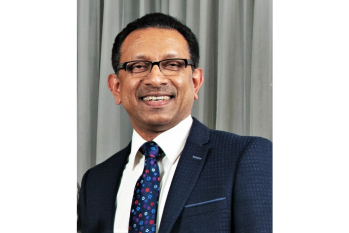Breastfeeding may protect infants from severe RSV-associated illnesses: UMHL research

- Breast milk can help reduce demand on hospital services caused by seasonal waves of respiratory illness
- Research by Prof Roy Philip and colleagues features in ‘The New York Times’
UL Hospitals Group consultant neonatologist Prof Roy K Philip was to the fore of a major review of two decades worth of international research that suggests breastfeeding offers protection to infants from the most severe respiratory syncytial virus (RSV)-associated illnesses of the kind that drove a huge wave in paediatric hospitalisations across Ireland and around the world prior to Christmas 2022.
The RSV-associated study was one of two pieces of research emerging from University Maternity Hospital Limerick (UMHL) that have gained international attention in the year to date, not just in academic journals but also in the pages of The New York Times.
Prof Philip and colleagues Gabriela M Mineva, Helen Purtill and Prof Colum P Dunne, have just published the report of their findings in the journal, BMJ Global Health. (Click the BMJ link here to download the paper in full)
The researchers contend their findings point to the need for global promotion of breastfeeding as an adjunct primary preventative measure against RSV illnesses.
There is no vaccine available for RSV-associated acute lower respiratory infections (ALRIs), for infants and children and there is no effective or standardised treatment currently available. Costly immunoprophylaxis-based prevention, delivered via monthly injections is available only for high-risk infants.
RSV is a contagious virus that in most infants infects the upper respiratory tract, with symptoms such as mild cough, cold or runny nose. But in approximately 25% of infants, the virus penetrates deep into the lungs and causes bronchiolitis or pneumonia, acute lower respiratory infections (ALRI) that lead in some cases to hospitalisation.
Prof Philip and colleagues’ systematic review analysed English language research from 2000 to 2021 into exclusively or partially breastfed infants of under 12 months who developed RSV-associated ALRI. More than 1,368 studies were screened, and the final analysis drew from research undertaken in 12 countries, including a total of 16,787 infants from 31 countries.
Findings from this systematic review of the two-decades of international research indicate that:
Exclusive breastfeeding for infants 4-6 months and older significantly lowered hospitalisation, length of stay, supplemental oxygen demand and admission to intensive care units
Non-breastfeeding practices pose a significant risk for severe RSV-associated ALRI and hospitalisation
The findings underline the results of a 2022 study by Prof Philip and colleagues from University Maternity Hospital Limerick (UMHL), the School of Medicine at University of Limerick (UL) and Dublin City University. That study, published in the peer-reviewed Maternal & Child Nutrition journal (download here), analysed 20 years of birth data from UMHL. The paper included 10 recommendations for elevating the regional and national breastfeeding rates, currently among the lowest in the world, to more favourable international levels.
For Prof Philip, breastfeeding is the most natural feeding strategy for a baby, and the latest research provides yet another compelling reason for prioritising a national promotional campaign on breastfeeding and addressing deficits in prenatal and antenatal educational support.
“We know that breastfeeding rates, not just in the Mid-West, but in Ireland, are too low. This is for a variety of reasons, and it’s important that we should not forget that for some women and infants, breastfeeding may not be possible. However, what we do know from our studies is that almost two thirds of women in UMHL are initiating breastfeeding while in hospital. However, this falls off after discharge, because the system has not done enough to support it. With investment in promotion and support showing the benefits of breastfeeding, society begins to feel that breastfeeding is a norm, and it should be our national vision to get breastfeeding initiation rates above 90%,” Prof Philip said.
As the study points out, RSV infections that were ‘elbowed out’ by SARS-CoV-2 during the initial phases of the COVID-19 pandemic and lockdown resurfaced with vigour last winter. “Breastfeeding is the most environmentally-‘green’ feeding strategy. And with various respiratory infections now resurgent as societies re-emerge from lengthy pandemic lockdowns, it becomes something even more effectively attuned to the world we now live in, and can play a key part in reducing winter demand on acute hospital services caused by seasonal waves of respiratory illness.”
Prof Philip also led pioneering 2020 research at UMHL that described “an intriguing reduction of preterm births during COVID-19 lockdown”. Now, a collaborative project (iPOP study) of over 100 researchers from around, including Prof Philip, analysed 52-million births from 26 countries that was recently published in the Nature Human Behaviour journal (available at this link). At the beginning of March, this research featured in an article in The New York Times, which highlighted the team’s original work, and their contribution to the worldwide collaborative study (available at this link).
“The international recognition of our clinical epidemiological research is of course very welcome, as is the coverage in The New York Times, with its huge international readership. But our focus remains on undertaking further research related to preterm births and optimising the Irish breastfeeding rates,” said Prof Philip.

